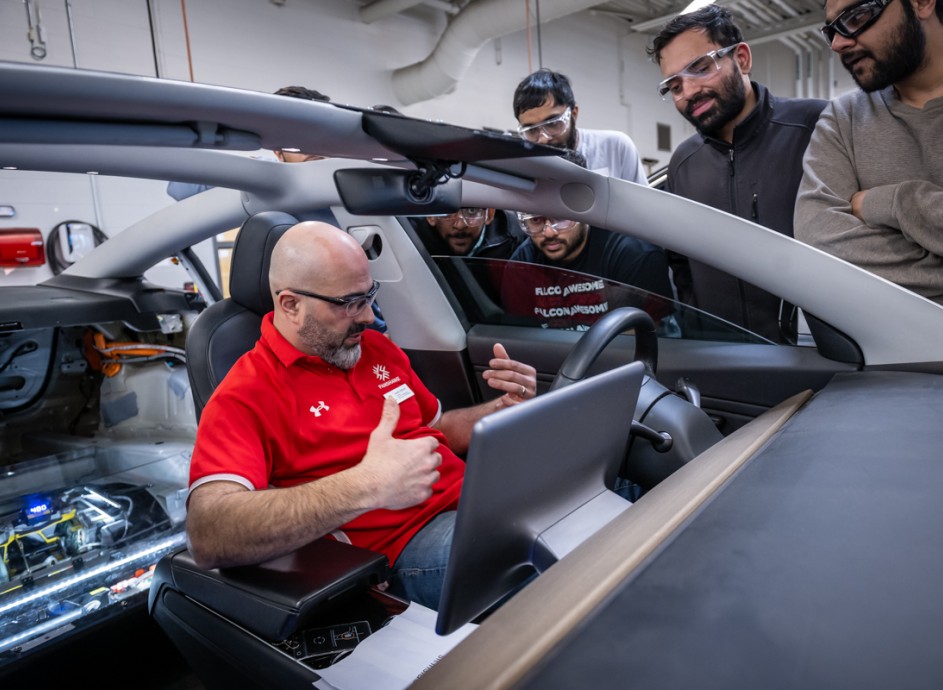
Program Overview
Program Details
Full Time Offerings
Your Learning Experience
This program is available for international students only. Domestic students can enrol in GVN2.
The Green Vehicle Technician program will be delivered face-to-face in cutting-edge EV vehicle shops that have state-of-the-art tools and diagnosing equipment. Students will gain hands-on experience completing practical labs, including general electrical, electrical/electronic circuits, schematics and components, communications, bench trainers, and on-vehicle fault diagnosis.
Advanced topics will include power systems, rechargeable energy storage systems (RESS), fuel cells, EV controls, EV maintenance, HVAC, and advanced electrical, electronics, and communications. As the automotive industry continues to evolve, the curriculum will evolve to incorporate other green vehicle technologies, such as hydrogen fuel cells and hydrogen technology.
Global demand for EVs is projected to grow six fold in the next few years from 6.5 million annual unit sales to approximately 40 million units. Additionally, the Federal Government has set targets for one-fifth of all passenger cars, SUVs, and trucks sold in Canada to be electric vehicles by 2026, increasing to 60% of sales by 2030 and 100% of sales in 2035.
Meeting these targets requires workers with the knowledge and skills to assemble, service, repair, promote, and sell these electric vehicles and their components.
This diploma program also offers pathways into the Automotive Sales and Automotive Service Management graduate certificate program.
Career Information
Graduates of this program will be prepared for employment with EV manufacturers and dealers in servicing, parts, warranty claims, merchandising sales, and insurance estimating. Graduates of the program will also be well positioned to enter the workplace in the automotive service technician trade for an apprenticeship.
Learning Outcomes
- Analyze, diagnose, and solve various faults in motive vehicle electrical systems in compliance to manufacturing specifications.
- Diagnose and repair climate control and HVAC systems, and electrical, electronic, and personal safety components in compliance with manufacturers’ recommendations.
- Identify, inspect, and conduct tests on basic engine systems, drive train systems, suspension, steering and brake systems on both internal combustion power train, and electrified vehicles to manufacturers’ recommendations.
- Use a variety of troubleshooting techniques to address technical problems and solve issues according to manufacturer specifications.
- Assist in quality-control and quality-assurance programs and procedures in accordance with related industry standards and policies.
- Develop and use personal and professional strategies and plans to improve professional growth, job performance, and work relationships.
- Complete work on green technology and electrified vehicles and components ethically and in compliance with occupational, health, safety, and environmental law, policies, and codes.
- Prepare and interpret electrical schematics in compliance with related industry quality standards.
- Select, disassemble and assemble electric and green vehicle components to required specifications under the supervision of a qualified person.
- Document and communicate service and technical information such as repair or part requirements to improve customer service.
Admission Requirements
International Admission Equivalencies
English Language Requirements
English Language Requirements
Applicant Selection Criteria
Applicant Selection Criteria
Courses
| Level 1 | ||||
| GRVT-1000 | Safety Fundamentals | 3 | ||
Describe the safety practices in Electric Vehicle (EV) repair environments and operation. Identify hazards, Personal Protective Equipment (PPE), emergency procedures, safety regulations, and legislation. Demonstrate high voltage safety and disconnect procedures. | ||||
| GRVT-1001 | Mathematics for EV Technology | 4 | ||
Solve algebraic and calculus equations with a focus on their practical applications in automotive/truck and coach systems. Demonstrate use of manufacture specific charts, tables, and reference materials. Solve EV specific problems using statistical formulas and principles for sampling. | ||||
| GRVT-1002 | Physics Fundamentals for EV's | 4 | ||
Demonstrate and understanding of the fundamental principles of physics within the context of electric vehicle (EV) technology using mechanics, electromagnetism, thermodynamics, and optics, emphasizing their real-world applications in automotive systems. | ||||
| GRVT-1003 | Introduction to Electric Vehicles | 4 | ||
An introductory course to electric vehicles covering their history, basic principles, and components. Students will identify EV and green vehicle types, compare battery technologies, describe charging infrastructure, and environmental impacts. | ||||
| WRIT-1039 | Reason & Writing 1-Technology | 3 | ||
This course will introduce technology students to essential principles of reading, writing, and reasoning at the postsecondary level. Students will identify, summarize, analyze, and evaluate multiple short readings and write persuasive response essays to develop their vocabulary, comprehension, grammar, and critical thinking. | ||||
| BUSI-1231 | Introduction to Business | 3 | ||
Introduction to Business and Small Business Concepts: This introductory course will examine some of the basic concepts necessary for effectively running a small business. A wide variety of topics such as the social and ethical responsibility of a contemporary business, marketing, importance of human resource management and financial resource management, and current trends in a Canadian business setting, will be studied. | ||||
Tuition Summary
London
*Total program costs are approximate, subject to change and do not include the health and dental plan fee, bus pass fee or program general expenses.



